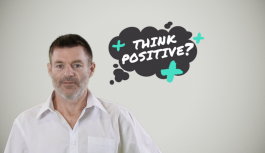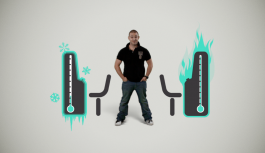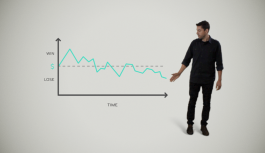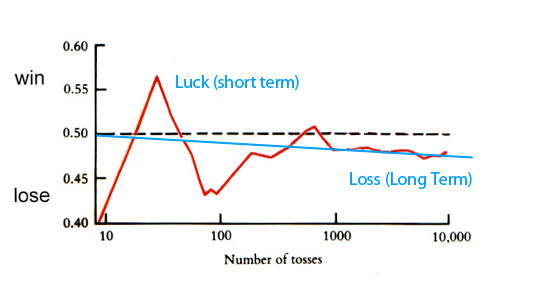Call us 1800 243 232
Menu
Call us 1800 243 232
Let’s look at some of the common myths and beliefs that people associate with gambling*:
*Know Your Odds, Gambling Support Program, Department of Premier and Cabinet

Do you think a positive attitude will make a difference to your chances of winning?
Recent Tasmanian research* shows that 10% to 15% of gamblers wrongly believe that positive thinking will make them win.
It would be great if we could influence the outcomes of games of chance in the same way we can visualise for example, a beautiful garden, and then go about making it.
Unfortunately we can’t make a gambling win happen like that. We can’t influence the outcomes at all.
There is one very positive action you could take: quit while you’re ahead, (if you’re lucky enough to be ahead).
Hoping, wishing or even needing to win money has absolutely no influence on the outcome of a game of chance.
*Gambling myths and false beliefs. Agfest Survey Tasmanian Department of Health and Human Services. 2005.

Gamblers sometimes describe coincidences or fortunate events as “lucky charms” or “signs”.
They act on these as if the outcome of their gambling will be luckier too.
For example, John believes in good luck.
When he arrives at work today he finds that his lucky car space is available.
This event is a sign to John that today is a lucky day, so he goes to the casino after work for a quick bet.
The only things that influence whether John will win or not is the way the game is designed and manufactured.

We’ve all heard someone say “you’re not a quitter are you?” as if deciding to stop trying – with a hobby, or sport, or work task for example – is a sign of weakness.
But this can be a risky attitude when it comes to gambling, because chasing losses will lead to more losses over time, as the effect of the house edge and the odds come into play.
Not every gambler knows when to stop. Some keep playing, trying to win back what they’ve lost.
An extremely common, idealised belief is gamblers should “hang in there” for the big win.
Not quitting will mean losing in the long run.

Some people get a feeling that “It’s their lucky day!”
Or they wake up in the morning with a “feeling” they might win.
Beware: What you ‘feel’ cannot and does not influence the outcome of a bet.
People may win in the short term, and may even have a few wins in a row.
They then think of this as being lucky.
But over time, luck is cancelled out by the game’s odds and the house edge.
Again, the longer people play the more they lose.

Sometimes when things are going against us and we see other people doing well it’s easy to think “it’s my turn for a lucky break”, or “I am entitled to a good life and good fortune just as much as the next person”.
It’s fine to have these beliefs, but using them as an excuse or reason to gamble won’t improve your chances of winning.
A person may keep gambling in the belief they will win because the world owes them in some way.
But they have no better chance of winning than anyone else.

The outcome of games of chance is completely random: people can’t influence it, regardless of what they do.
For lotteries, this means betting the same numbers every week is no more likely to win than betting different numbers.
Most people in Tasmania who develop gambling problems do so on poker machines.
Some people play two machines at the same time.
They may win more often, but they’ll also lose more often, and lose more over time.
There’s no system that can beat the machines. The house edge is too high.
The same goes for people who “double up” their bets. When they win they will win more.
However, the house edge makes it certain that, over time, they will lose.

When the payouts of machines are analysed, there are sometimes patterns of more frequent payouts.
That’s because the random number selector is just that: random.
There’ll be runs of payouts, like when a coin is tossed and a run of heads or tails occurs.
But the mistake is in thinking the machines are programmed to pay out in this way and that such runs can be reliably predicted.
The chances of a win are exactly the same for every spin.
Future gambling outcomes are in no way influenced by previous outcomes.

This is probably the most common myth, but each time someone places a bet, the outcome is completely independent of the previous one.
The odds are no more in a person’s favour on the tenth bet than they were on the first bet.
“I almost won; I must be due for a win”.
“Almost” winning in no way means that a real win is around the corner.
The odds of winning a prize in a gambling game vary according to many factors, like the number of prizes, the type of game, the size of the prize and so on.
The laws of probability are such that in most games you’ll always have to bet more over time to win a major prize than the actual prize is worth.
You might win small prizes like a $5 scratchie win, but how much have you already paid for the win?…
And do you keep the prize or buy another ticket?

The Gambler’s Fallacy is the belief held by lots of gamblers that an event (like a win on a poker machine) can be “due” to happen.
For example, some people think that if one colour in roulette, say red, has won many times in a row, then black is “due” to win.
This is incorrect. It doesn’t matter how many times in a row red has won, the odds of black winning on the next spin will always be the same.